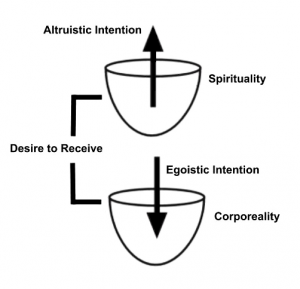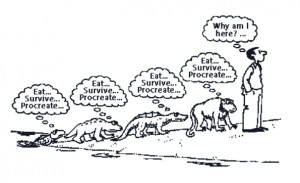“Is Spiritual Love Different From The Love We Know? If Yes, Can We Do Something To Nurture It?” (Quora)
 Michael Laitman, On Quora: “Is spiritual love different from the love we know? If yes, can we do something to nurture it?“
Michael Laitman, On Quora: “Is spiritual love different from the love we know? If yes, can we do something to nurture it?“
The love we know, or corporeal love, involves loving whoever or whatever gives us pleasure. Spiritual love, by contrast, is built on feeling an inner distance, rejection, and opposition to others, and building love upon that distance.
In other words, the love we know is that which appears in our inborn ego, where we feel a natural attraction and closeness to one another. Each person who feels such love does so based on the calculation that they will ultimately benefit from that love. Such is the calculation of our egoistic nature, which is a desire to enjoy from other people and things. Therefore, according to the love we know—corporeal love—we feel love, attraction, and closeness to each other sometimes, and at other times, hatred, rejection and distance.
Spiritual love, however, requires feeling distance, rejection, and opposition to each other together with an attitude of love, connection and attraction that we build above those sensations. In our current reality, we cannot simultaneously feel love and hatred toward others, but we feel those sensations at different times. Spiritual love, therefore, requires great artistry in the spiritual process of rising above the ego to positively connect with others, and we need to become worthy of attaining that lofty level of love.
However, we are reaching a level in our development where we become increasingly prepared to experience spiritual love. On one hand, we see that the love we know is leading us into more and more problems. The bigger our ego becomes, the more we demand in order to fulfill ourselves, and the harder we find it to become fulfilled. On the other hand, we are getting prepared to become more mature.
Sweet food can help us see an example of this maturation process. Children usually like sweet food that is only sweet, but when we grow up, we often like to have sweet food together with or after something spicy, bitter or sour. The more we mature, the more we feel incapable of enjoying from one thing alone, but require the thing and its opposite.
We also see how if we had experienced only positive states in life, without the need to strive and overcome, and without feeling boundaries and criticism, then we would feel as if our life lacks something. We are built in a way where we desire to have graspable points for other calculations, and thus we develop a need to add bitterness, sourness and spice in order to taste and enjoy the sweetness. This tendency stems from the basis of our existence, where we—created beings—were originally created opposite from nature: Nature is a quality of love that solely wishes to bestow pleasure and fulfillment, and we are made of an opposite quality that solely wishes to receive pleasure and fulfillment.
Therefore, in order that we “taste the sweetness” of spiritual love, we need to attain the quality of love and bestowal that does not exist in our inborn receptive nature, and thus need to build that quality in us upon our natural rejection and distance from those qualities. This is possible with the guidance of a method—the wisdom of Kabbalah—which teaches the ways of rising above the transience and incomplete nature of the ego in order to discover the quality of spiritual love, which is eternal and whole.
Kabbalists have written about spiritual love—“Love will cover all crimes” (Proverbs 10:12)—where the “crimes” are the distance, rejection and opposition we feel in our ego. The more we implement such a form of love in our spiritual development, the more we will attain everything that nature laid out for us in order to attain our ultimate purpose of existence: the sensation of love in its perfection, wholeness and eternity.
Based on the Daily Kabbalah Lesson with Kabbalist Dr. Michael Laitman on January 29, 2021. Written/edited by students of Kabbalist Dr. Michael Laitman.
Photo by Tamanna Rumee on Unsplash.
















